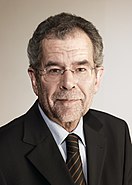Austrian presidential election, 2016
|
|
|||||||||||||||||||
|---|---|---|---|---|---|---|---|---|---|---|---|---|---|---|---|---|---|---|---|
|
|||||||||||||||||||
|
|||||||||||||||||||
|
|||||||||||||||||||
Alexander Van der Bellen
Independent
Presidential elections were held in Austria on 24 April 2016, with a second round run-off on 22 May 2016. However, the results of the second round were annulled and a re-vote took place on 4 December 2016.
The President of Austria is directly elected by universal adult suffrage once every six years. The election is held under a two-round system; if no candidate receives more than 50% of votes cast in the first round, then a second ballot occurs in which only those two candidates who received the greatest number of votes in the first round may stand. The constitution grants the president the power to appoint the Chancellor and, by extension, federal cabinet ministers, Supreme Court justices, military officers, and most major bureaucrats. The president may dissolve the National Council. In practice, however, the president acts as a figurehead.
Incumbent president Heinz Fischer had served two terms and was not eligible to be elected for a third successive term. In the first round of the election, Norbert Hofer of the Freedom Party of Austria (FPÖ) received the most votes. Alexander Van der Bellen, a member of the Austrian Greens contesting as an independent, placed second. The candidates of the two governing parties, the Social Democratic and Austrian People's parties, placed fourth and fifth respectively, behind independent Irmgard Griss in third place. Since no candidate received a majority of the vote, Hofer and Van der Bellen went head-to-head in the second round in May. This was the first time since the Second World War that an Austrian president had not been backed by either the People's or the Social Democratic party. During the run-off, Van der Bellen defeated Hofer on 23 May 2016 after the postal ballots had been counted.
...
Wikipedia


